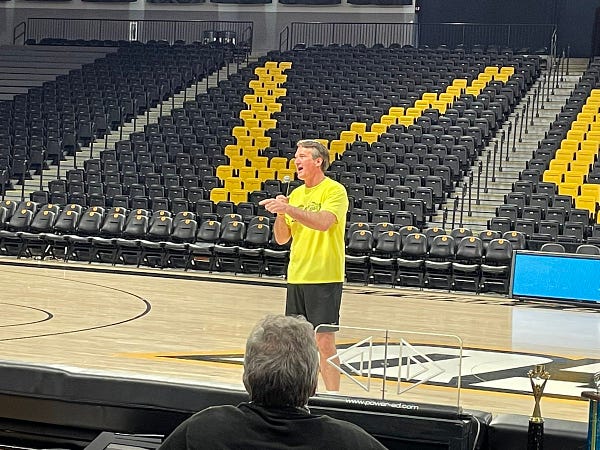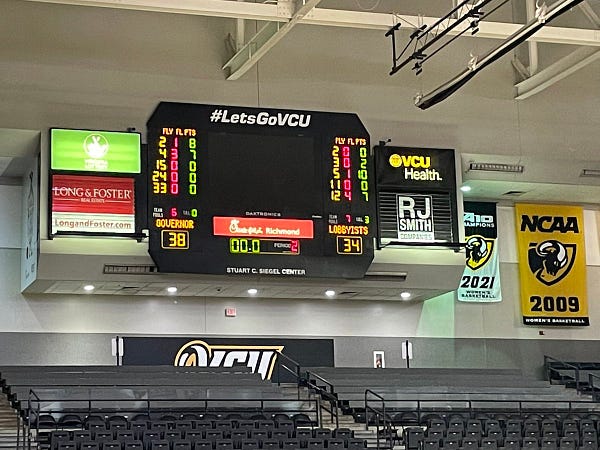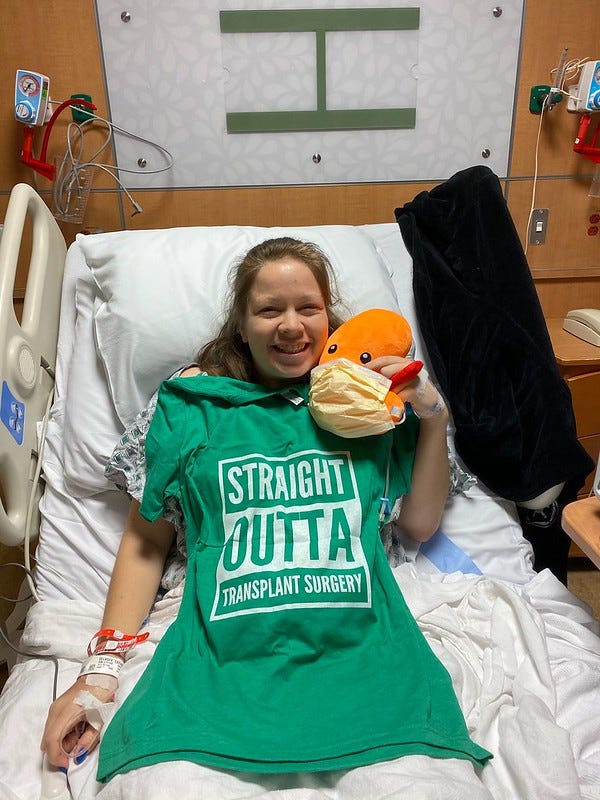The Senate Education and Health Committee killed key GOP bills this morning
The latest in Virginia politics.
This is a daily newsletter covering Virginia politics from top to bottom. Please consider becoming the ultimate political insider by supporting non-partisan, independent news and becoming a paid subscriber to this newsletter today.
The Rundown
The Senate Education and Health Committee took up the final divisive concepts bill from the House early Thursday morning
Governor Youngkin signed eight bills into law Wednesday
Living organ donors help spearhead legislative protection
Highlights from the General Assembly’s charity basketball games
Republican campaign promises die in the Senate Thursday morning
The Senate Health and Education Committee quickly killed a bill from Del. Dave Larock (R) that would have banned the teaching of divisive concepts in Virginia public schools. This is the legislation aimed at codifying Governor Youngkin’s Executive Order which intended to ban Critical Race Theory. With the House version of this bill dying in the Senate, this legislation is dead for the session.
A bill that was intended to mandate a school resource officer be in every school in Virginia was amended by the committee to remove the mandate. Republican Senator David Suetterlein pointed out that the mandate is not possible for rural districts.
A bill from Del. Amanda Batten (R) would have included cultural competency evaluations of teachers every two years if their school districts have a cultural competency policy in place. It would have required public notice before adoption and implementation of cultural competency training policies. The bill passed 51-48 in the House but failed to report out of the Senate Health and Ed Committee Thursday.
Under current law, such an evaluation of cultural competency is required and not conditioned upon any such action of the local school board. The bill would have permitted any school board to adopt and implement policies that require each teacher and any other school board employee holding a license issued by the Board of Education to complete cultural competency training, in accordance with guidance issued by the Board of Education, at least every two years, but only after providing 30 days' advanced written notice of and holding a public hearing regarding the adoption and implementation of such policies. Current law requires such cultural competency training and makes no provision for such notice and public hearing.
The governor signed eight bills Wednesday. Here is what they do:
HB 269, patroned by Delegate Kathy Byron, R-Bedford, extends the sunset to the Major Business Facility Job Tax Credit from 2022 to July 1, 2025. Qualified companies locating or expanding in Virginia are eligible to receive a $1,000 income tax credit for each new full-time job created over a threshold number of jobs beginning in the first taxable year following the taxable year in which the major business facility commenced or expanded its operations. The Governor and Delegate Byron were joined by Secretary of Commerce and Trade Caren Merrick.
HB 518, patroned by Delegate Christopher Head, R-Botetourt, streamlines the collection and remittance process for travel intermediaries.
HB 324, patroned by Delegate Angelia Williams Graves, D-Norfolk, updates provisions of the Shipping and Logistics Headquarters Grant Program that was originally established in 2021.
HB 148, patroned by Delegate Chris Runion, R-Rockingham, allows localities to self-certify pollution control equipment for the exemption of sales & use tax already permitted. Under current law, the state certifying authorities are the State Water Control Board or the Virginia Department of Health for water pollution and the Virginia Waste Management Board for waste disposal facilities.
HB 462, patroned by Delegate Terry Austin, R-Botetourt, extends the aviation materials and tools sales and use tax exemption for both state and local taxes to July 1, 2025. This bill also narrows the definition of aircraft covered by this exemption to those with a minimum takeoff weight of at least 2,400 pounds.
HB 473, patroned by David Bulova, D-Fairfax, eases reconciliation efforts with the hybrid retirement plan by separating existing blended defined benefit and defined contribution rates. This also allows more flexibility for individuals to change their voluntary contributions monthly instead of quarterly, making government work better for them. This has a delayed implementation date of July 1, 2024.
HB 3, patroned by Delegate Lee Ware, R-Powhatan, extends for another three years the current Retail Sales and Use Tax exemption for sales of $1,000 or more of gold, silver, and platinum bullion and legal tender coins.
HB 165, patroned by Delegate Barry Knight, R-Virginia Beach, authorizes issuance of bonds for James Madison University and Virginia Tech. This is a routine 9(c) bond, these bonds are typically for dorms or dining and occur routinely and yearly. These bonds do not impact general funds, are in the budget and have no debt impact. The debt does not impact Virginia's debt capacity since the debt service is paid from project revenues as students pay for rooms throughout the semester.
The governor’s basketball team was victorious in their game against lobbyists last night at VCU


Living organ donors help spearhead legislative protection
By Joe Dodson, Capital News Service
RICHMOND, Va. -- Kat Velkoff was in college when she made a decision that would save a life nearly a decade later.
“I found out that you could be a kidney donor,” Velkoff said. “I just always knew that that was something I wanted to do.”
Velkoff said she had time to donate a kidney when the COVID-19 pandemic hit. Before she could donate she was assigned a social worker who determines if applicants are mentally capable of making the decision to donate.
The social worker advised Velkoff to consider purchasing life insurance prior to donating so that she wouldn’t have to pay a higher premium after. Velkoff would have one kidney, which is considered a pre-existing condition that would raise her premiums.
Health insurers are prohibited from discriminating based on donor status because of the Affordable Care Act, but life, disability, and long-term insurance companies are not.
Velkoff, an ambassador for the American Kidney Fund, inspired legislation making headway in the Virginia General Assembly that would prohibit life, disability, and long-term insurance companies from denying others insurance or charging higher rates solely based on their organ donor status. Del. Karrie K. Delaney, D-Fairfax, introduced House Bill 421 while Sen. Adam Ebbin, D-Alexandria, introduced Senate Bill 271.
The Senate bill incorporated a bill from Sen. Ghazala F. Hashmi, D-Richmond, which required employers with 15 or more employees to allow 60 days of unpaid leave per year to serve as an organ donor, or 30 days of unpaid leave per year to serve as a bone marrow donor.
Those stipulations were removed once the bill reached the House, but Ebbin’s office hopes they will be added back to the final version.
Maryland and Kentucky are among 20 states that have passed similar laws, according to Melanie Lendnal, senior director of state policy and advocacy for the American Kidney Fund. The American Kidney Fund is working with Virginia and 12 other states to pass similar legislation this year, Lendnal said.
The state bills are modeled off of the federal Living Donor Protection Act, which was first proposed in Congress in 2017. The bill has failed to pass in multiple sessions, according to Lendnal.
“The goal ultimately is to ensure that we are able to remove as many barriers as possible for would-be living organ donors,” Lendnal said. “If people donate more, more lives can be saved.”
Karl Neumann wanted to donate an organ after spending his nursing career in organ transplant units. Neumann’s hopes for becoming a donor moved to the back burner after he tested positive in 2009 for HIV. Passage of the HOPE Act in 2013 allowed HIV positive people to donate organs to other HIV positive people. Only kidney and liver transplants were allowed when the bill took effect in 2015, but it was expanded in 2020 to include organs of any type.
Neumann became the second living HIV-positive organ donor in the nation in 2019. Neumann said his workplace gave him plenty of time off during the organ donation process, but time off would help other donors.
“There are donors that come in that are very worried about this,” Neumann said. “This is a very realistic thing for a lot of potential donors.”
Delaney’s amended bill would allow employers to also adopt or retain more generous leave policies.
Patrick Kacani received an email from a former University of Richmond roommate regarding the health of Matt Felix, their former roommate and Kacani’s soccer teammate. Felix needed a liver transplant.
Despite not knowing yet if he would be a match, Kacani said he had a feeling.
“It was this feeling that came over me that I really can’t describe,” Kacani said. “It was this sense of clarity that I’m going to do this.”
A liver transplant can take three months on average to recover from, according to Kacani. Kacani received short-term disability checks during his 10-week recovery.
Kacani supports the bill's provision of time off from work. He outlined some of the common post-surgery complications that he worried about pre-transplant, which can lead to a longer than anticipated recovery time, including hernias and bile leaks.
When Tracey and Rick Ridpath’s friend died of a cancer involving his bladder, the couple felt inspired to save someone else's life by donating their second kidneys.
“We couldn’t save Roger but there's lots of other fathers, and uncles and grandfathers out there,” Tracey Ridpath said. “I’ll try and save somebody else in memory of our friend Roger.”
The pair, both who are K-12 teachers, completed their transplants during school breaks and also used accumulated sick days. However, they support legislation that allows organ donors unpaid time off for people who don’t have enough sick leave.
“If you’re a brand new teacher and you only got 10 sick days and you have a kid who gets sick all the time you might be worried about needing to use up your sick days,” Rick Ridpath said.
There have been 5,528 donations made from living donors in Virginia since 1988, according to the Organ Procurement and Transplantation Network. One in every four donations in Virginia came from living organ donors in 2021, Lendnal said.
“The outcomes for patients who receive donations from living donors, as opposed to a deceased donor, are significantly increased,” Lendnal said.
Velkoff met her organ recipient, then 24-year old Agustin De La O Martinez. They often go to dinner together, and she said she enjoys seeing him do the things he couldn’t do while on dialysis.
“Donating a kidney is the best thing I’ve ever done with my life,” Velkoff said. “I think we all have more than we need.”
Two Dems join GOP to advance bill that closes inactive police files to the public - Richmond Times-Dispatch
by Patrick Wilson
Two Democratic senators joined Republicans on Wednesday to advance GOP legislation that would close off public access to inactive police files in Virginia.
The debate over the bill, sponsored by Del. Rob Bell, R-Albemarle, has been muddled with misinformation and unanswered questions. That continued Wednesday, when a state senator who voted for the bill in committee later said he believed he was doing so to prevent photos of dead victims from being released publicly. Current law already prohibits that.
DIVIDED OVER DIVERSITY Fox News and the pressures at JMU's top - The Breeze
by Ashlyn Campbell & Kamryn Koch | The Breeze, edited by Jake Conley
It took not even a day for the hammer to fall. Following a JMU diversity training picked up by Fox News, the university’s community brought war to the leadership in Alumnae Hall. For the university, that Fox News article meant several weeks of intense public relations backlash and a campaign to balance a line between diversity and appeasement.
The article, published Aug. 19, alleges that JMU was “training student employees to recognize that people who identify as male, straight, cisgender, or Christian are ‘oppressors’ that engage in the ‘systematic subjugation’ of other social groups.”
More Virginia News
Miyares asks judge to dismiss ACLU mask mandate suit, deny injunction
House, Senate approve bill for college athletes' name, image and likeness rights
Bill to prevent a governor from interfering with state inspector general advances in legislature
Lawmakers kill measure to let people with criminal records be addiction counselors
Push to accelerate Richmond combined sewer fix halted in House







